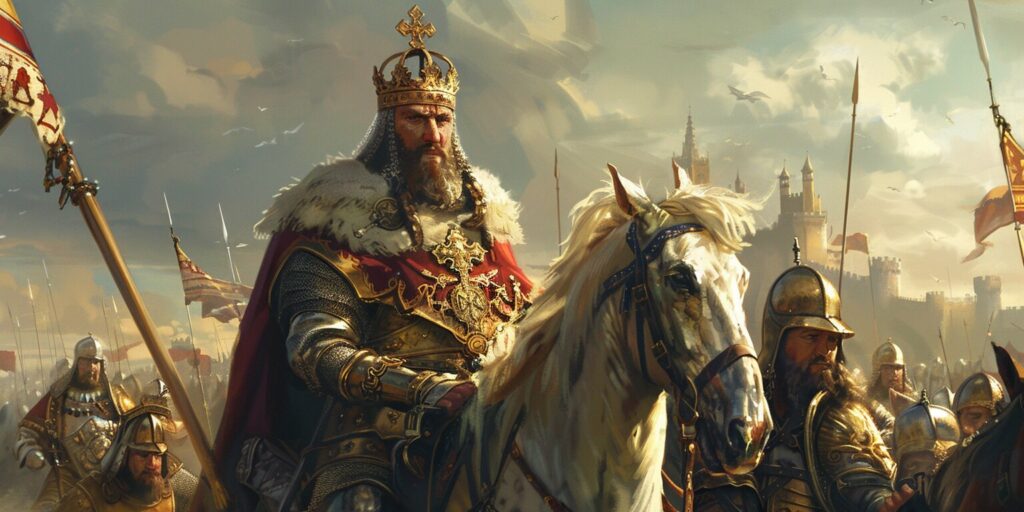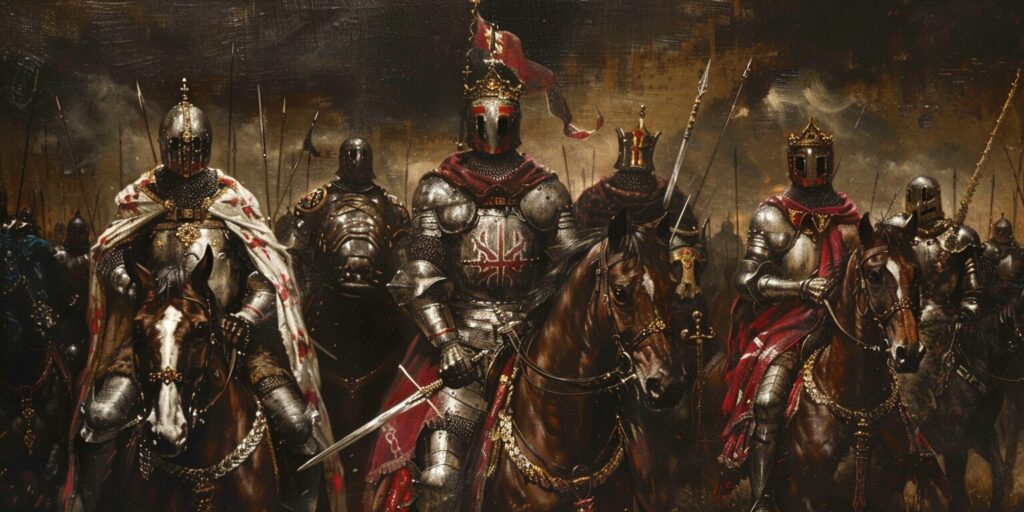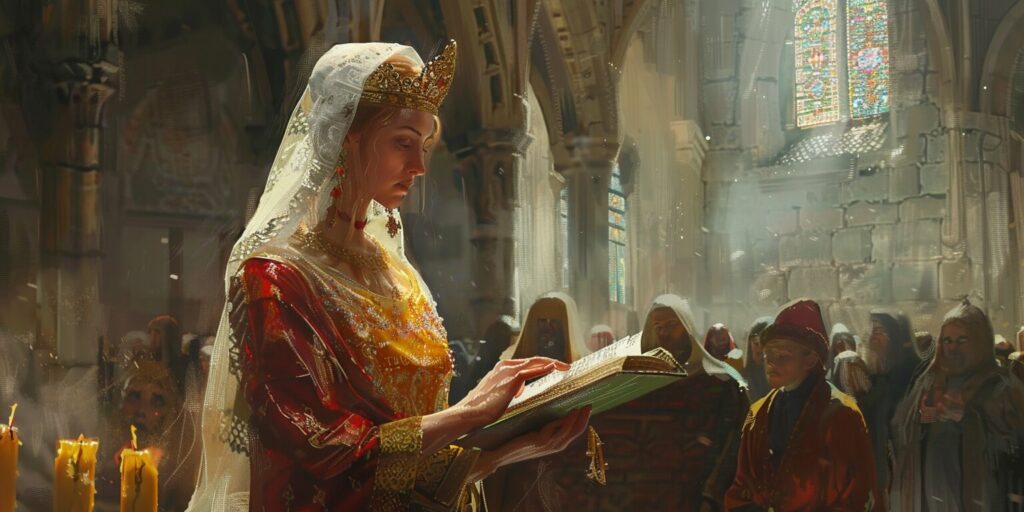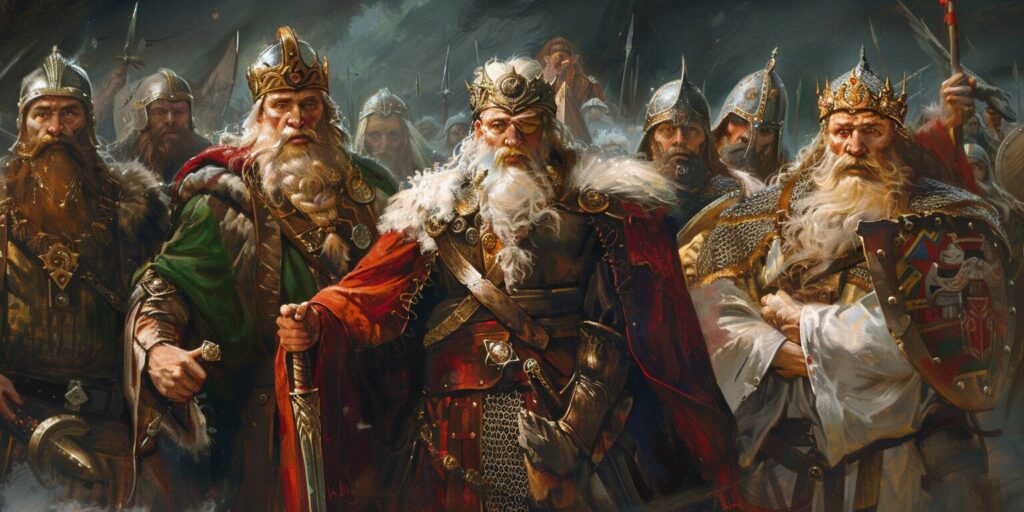Step into the medieval era and delve into the extraordinary lives of famous medieval leaders, including Eleanor of Aquitaine, who shaped the course of history. Learn how their strategic acumen, battlefield prowess, and political genius propelled them to greatness and immortalized their names in the annals of history.
Join us as we explore the exploits of these legendary kings, queens, commanders, and rulers who left an enduring mark on the medieval world and beyond. Uncover the secrets of their success, the challenges they faced, and the kingdoms they ruled with an iron fist. From the sweeping conquests of the vast Mongol Empire under the leadership of Genghis Khan, one of the most famous conquerors in military history, to the military renaissance engineered by Edward III of England, these medieval leaders set the stage for new realms of power and influence.
Who Were the Most Influential Medieval Kings?
Throughout medieval history, several kings stood out for their military prowess, strategic leadership, and lasting impact on their kingdoms. These medieval military leaders played a crucial role in shaping the course of European history, and their legacies endure to this day. Let us explore three influential medieval kings: Edward III, Henry V of England, and Saladin.
Edward III: The Architect of a Military Renaissance
Edward III of England is known as the architect of a military renaissance due to his significant contributions to transforming the English military and his role as one of the most famous medieval leaders. He played a pivotal role in establishing a formal military structure and modernizing England’s military tactics during the Hundred Years’ War. Edward III’s most notable military victory came at the Battle of Crécy, where his strategic brilliance and exceptional leadership led to a decisive English victory over the French, marking a pivotal moment in military history. His military career and achievements solidified his reputation as a skilled tactician and leader.
Henry V of England: The Warrior King
Henry V of England, often referred to as the Warrior King, left an indelible mark on English history through his military successes. His most renowned achievement, Richard II, came at the Battle of Agincourt during the Hundred Years’ War, showcasing his military genius. Despite being heavily outnumbered, Henry V’s valor and leadership guided his forces to a stunning victory over the French army. His exceptional battlefield prowess and unwavering determination made him a legendary figure in medieval history.
Saladin: Uniting Islamic Forces for Greatness
Saladin, the Sultan of Egypt and Syria, was a renowned medieval military leader who united Islamic forces and led successful campaigns against the Crusader states in North Africa. Saladin’s military prowess and diplomatic skills allowed him to forge alliances and build an empire that posed a formidable challenge to the Crusaders. He remains a respected and influential figure in the Islamic world. Saladin’s achievements highlight his ability to unite disparate forces and achieve greatness on the battlefield.
What Made These Leaders Stand Out?
Several leaders rose to prominence in the medieval era and left an indelible mark on history with their extraordinary accomplishments. Three of these remarkable figures were Charlemagne, Richard the Lionheart, and Genghis Khan.
Charlemagne: The Holy Roman Emperor and Conqueror
Charlemagne, also known as Charles the Great, was a towering figure in European history. As the Holy Roman Emperor, he ruled over the vast Frankish Kingdom and expanded his empire through military conquests. His determination to unite Western Europe under his rule was a testament to his tenacity and ambition.

What set Charlemagne apart was his military prowess and deep appreciation for education, arts, and architecture. He promoted scholarship and established schools and monasteries, fostering intellectual growth throughout his kingdom. Charlemagne’s commitment to learning helped to revitalize and preserve knowledge during a time of intellectual stagnation in Europe, establishing him as a key figure in the Holy Roman Empire.
Richard the Lionheart: A National Hero in Medieval England
In medieval England, Richard the Lionheart stood out as a national hero. As the King of England, he displayed exceptional valor and leadership during the Third Crusade. Richard inspired unwavering loyalty and admiration from his subjects, who saw him as a symbol of bravery and chivalry.
Richard the Lionheart’s military campaigns and strategic brilliance demonstrated his unwavering determination to retake the Holy Land from Sultan Saladin. Though the ultimate objective of the Crusade was not fully realized, Richard’s heroics on the battlefield left an enduring legacy in English history.
Genghis Khan: Conquering Territories in Asia
The legendary Genghis Khan is known as one of history’s most formidable conquerors. He founded the Mongol Empire and amassed territory on an unprecedented scale, establishing the largest contiguous empire in human history.
Genghis Khan’s military strategies and organizational skills were key to his success in military history. His ability to unite various tribes under his rule and wield their combined strength helped him conquer vast territories in Asia. His empire stretched from China to Europe, leaving an indelible mark on the map of the world.
These exceptional leaders, Charlemagne, Richard the Lionheart, and Genghis Khan, each carved out their place in history through their unique achievements, impacting their respective domains and the pages of medieval European history.
How Did They Impact Medieval History?
The Black Prince: Military Victories in the Hundred Years’ War
The Black Prince, also known as Edward, Prince of Wales, played a significant role in shaping medieval history through his military victories during the Hundred Years’ War. His leadership and strategic military tactics were instrumental in England’s success in the war, cementing his reputation as a skilled commander in military history.

The Black Prince’s military prowess was evident in his notable victories, such as the Battle of Poitiers in 1356. His tactical genius and ability to inspire his troops led to decisive triumphs against the French forces. These military achievements profoundly impacted the course of the war and the balance of power in medieval Europe.
The Black Prince’s military victories brought territorial gains for England, boosted the English troops’ morale, and elevated the English monarchy’s reputation. His success on the battlefield solidified his status as a respected military leader and contributed to England’s reputation as a formidable military power during the medieval era.
Alfred the Great: Uniting Anglo-Saxons in Times of Turmoil
Alfred the Great, King of the Anglo-Saxons, played a pivotal role in medieval history by uniting the disparate Anglo-Saxon kingdoms during a time of turmoil and defending them against Viking invasions. His leadership and resilience ensured the survival and eventual flourishing of Anglo-Saxon culture and identity, even against threats from North Africa.
Alfred the Great faced immense challenges as the Viking invasions threatened to dismantle the Anglo-Saxon kingdoms and erode their cultural heritage. In response to these threats, he organized and led a successful resistance, pushing them back and securing the borders of his kingdom, similar to the efforts of leaders in North Africa.
But Alfred’s contributions extended beyond military victories. He also implemented legal and administrative reforms, promoting education and fostering cultural Renaissance throughout his realm. His efforts laid the foundations for a unified England and established a legacy of strong Anglo-Saxon leadership that endured for centuries.
Alfred the Great’s impact on medieval history cannot be overstated. His leadership and strategic vision during a tumultuous period ensured the survival of the Anglo-Saxon kingdoms, preserving their unique cultural identity and laying the groundwork for a powerful empire that would shape the history of medieval England.
What Were the Key Achievements of These Medieval Leaders?
Lionheart in the Third Crusade: Challenging Sultan Saladin
King Richard the Lionheart’s participation in the Third Crusade proved to be a significant achievement in medieval history. As a skilled military leader, Lionheart challenged Sultan Saladin and showcased his strategic prowess through his military campaigns and actions. Although the Crusade did not result in a complete victory, Richard’s efforts left a lasting impact on the region and demonstrated his determination to defend his kingdom and assert his influence.
Edward II of England: Facing Revolts and Challenges
Edward II of England faced numerous revolts and challenges throughout his reign, which reflected the complex dynamics of medieval kingship and the shifting power structures of the time. He confronted conflicts with Scottish forces, leading to a notable defeat at the Battle of Bannockburn and internal political unrest, as evidenced by his struggles against nobles and factions within his kingdom. Edward II’s ability to navigate these challenges and retain his position of power was a remarkable achievement in the face of adversity.
How Did Eleanor of Aquitaine Influence the Politics and Culture of Medieval Europe?
Eleanor of Aquitaine was one of the most influential figures in medieval Europe, her impact resonating through the political and cultural spheres of the time. Born in 1122, Eleanor became Duchess of Aquitaine in her own right and later Queen consort of France and England through her marriage to Louis VII and Henry II. Her vast duchy of Aquitaine was a center of the arts and learning, which flourished under her patronage, helping to spur the development of courtly love literature and the troubadour tradition.

Politically, Eleanor’s influence was profound. Her marriage to Henry II significantly strengthened the Angevin Empire, bringing vast territories in France under English control through her dowry. Her active participation in state affairs, unusual for a woman of her time, showcased her formidable acumen and assertiveness. Eleanor was a patron of the arts and a shrewd political operator, evidenced by her support of her sons, including Richard the Lionheart, in their rebellions against their father, Henry II.
Her legacy extends into the cultural realm through her patronage of the arts and her promotion of the ideals of chivalry and romance, which have been immortalized in literature. Eleanor’s life and work left an indelible mark on the history of Europe, shaping the political landscape and influencing the cultural development of the continent during and beyond the Middle Ages.
Summary
In this article, we have delved into the legacies of some of the greatest medieval leaders, such as Eleanor of Aquitaine and those who ascended as King of the Franks, who left an indelible mark on history through their conquests and rule. These remarkable individuals, including Charlemagne, Richard the Lionheart, and Genghis Khan, shaped their kingdoms and profoundly influenced the entire world.
These leaders achieved greatness in their respective domains through military victories and strategic brilliance. Whether it was Charlemagne’s expansion of the Frankish Kingdom, Richard the Lionheart’s heroism during the Third Crusade, or Genghis Khan’s conquest of vast territories in Asia, their achievements continue to be recognized and celebrated.
Furthermore, these leaders faced numerous challenges and emerged triumphant. From uniting warring factions to defending against Viking invasions, they exhibited remarkable resilience and leadership in the face of adversity. Their legacies persist as a testament to their enduring impact on medieval history.
The achievements of these medieval leaders, including those who became part of the Holy Roman Empire, continue to be studied and revered today. Their stories serve as a reminder of the heights that can be achieved through determination, strategic thinking, and bold action. As we reflect on their legacies, we gain a deeper appreciation for the profound impact of these extraordinary individuals in shaping the course of history.

